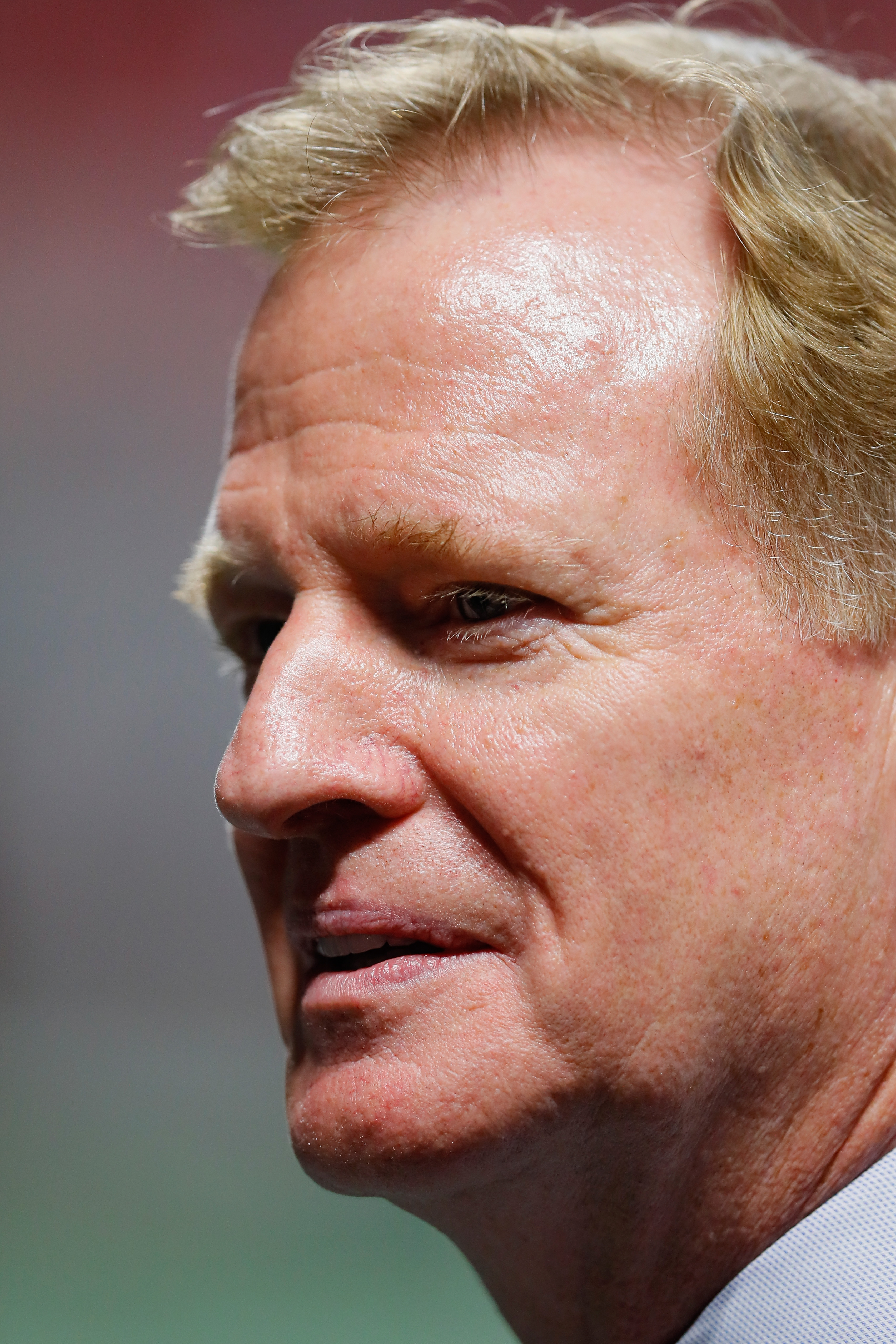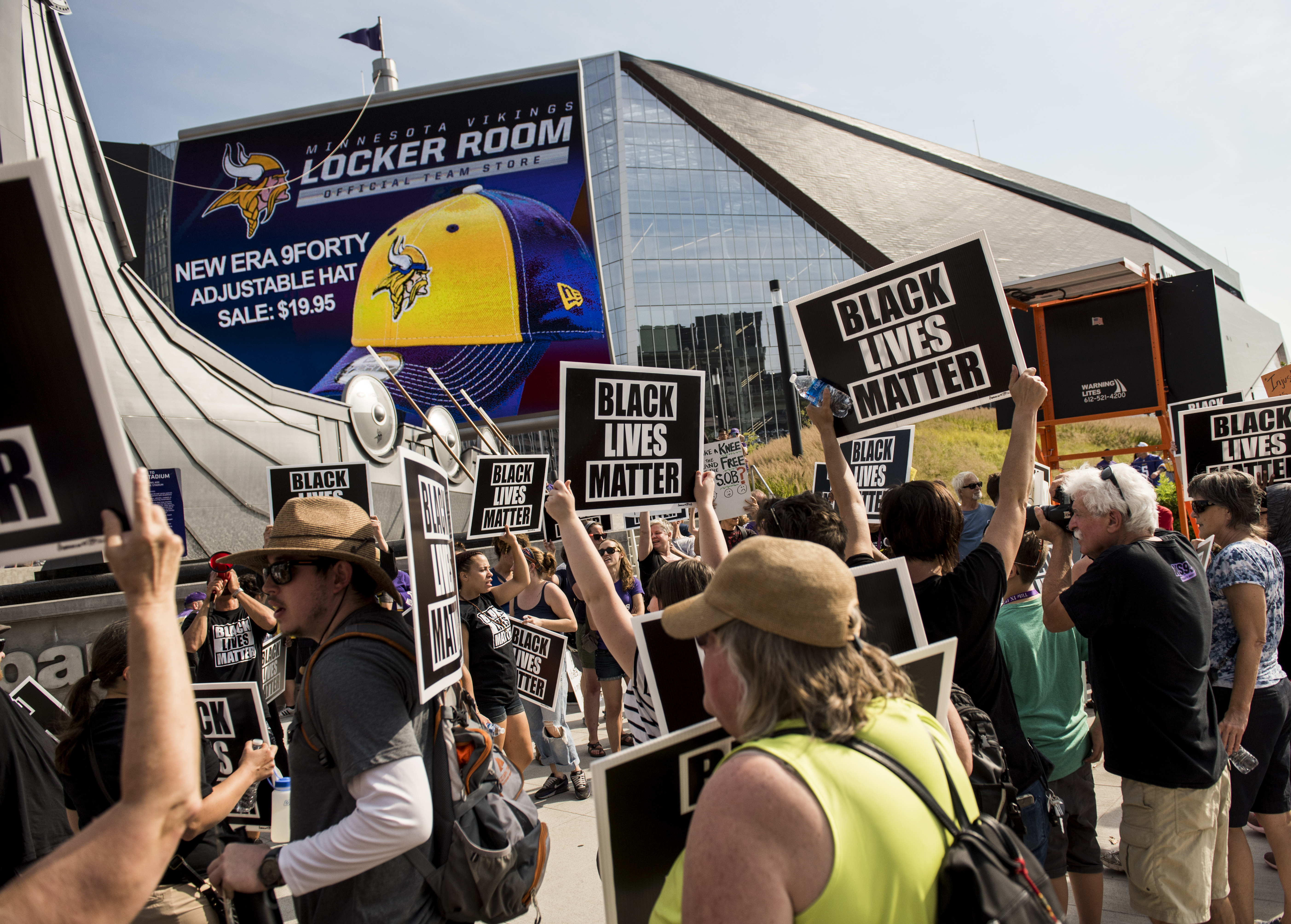
(Photo: Alex Wong/Getty Images)
After threatening the total destruction of North Korea on the floor of the United Nations last week, President Donald Trump seems to have channeled his anger toward a more domestic threat: the National Football League.
Trump spent this past weekend lambasting professional football players who chose to kneel during the national anthem, a movement started just over a year ago by former San Francisco 49ers quarterback Colin Kaepernick to express his unwillingness “[to] show pride in a flag for a country that oppresses black people and people of color,” as he said last year. Plenty of players have joined him in kneeling, and the beginning of the 2017 NFL regular season has once against thrust the issue into the spotlight—making it a prime target for Trump’s ire.
“Wouldn’t you love to see one of these NFL owners, when somebody disrespects our flag, to say: ‘Get that son of a bitch off the field right now. Out! He’s fired,” Trump said during a rally in Alabama on Friday in support of Republican senatorial primary candidate Luther Strange. In the subsequent 48 hours, Trump went on to disinvite the National Basketball Association’s Golden State Warriors from visiting the White House (after outspoken star forward Stephen Curry stated he would not attend), tangle with NBA star LeBron James, diss NFL commissioner Roger Goodell, and use disabled veterans as a political prop. (After the National Hockey League’s Pittsburgh Penguins came to Trump’s defense, the president invited them to visit in the Warriors’ stead; the NFL’s Pittsburgh Steelers remained in the locker room during the national anthem.)
Going to the White House is considered a great honor for a championship team.Stephen Curry is hesitating,therefore invitation is withdrawn!
— Donald J. Trump (@realDonaldTrump) September 23, 2017
Of course, a mid-morning one-liner from the president does not represent the federal government’s official approach to issues of speech and loyalty. But in the wake of his public statements on free speech surrounding the events in Charlottesville, Virginia, in mid-August, Trump’s war on the outspoken African-American athletes of the NFL and NBA is a reminder that, despite the use of “law and order” rhetoric as a pillar of his campaign promise to “Make America Great Again,” the Trump presidency has, in fact, forsaken law for order, ignoring the reality of free speech as a tool of white supremacy.

(Photo: Kevin C. Cox/Getty Images)
It’s not hard to recognize the absurdity of the Trump administration’s arguments against two of the nation’s most beloved sporting institutions. It’s been almost 30 years since the United States Supreme Court rulings in 1989’s Texas v. Johnson and 1990’s United States v. Eichman deemed prohibitions on the desecration of the American flag to be unconstitutional. Consider then that, in trying to lend his support to the free speech elements of Trump’s NFL-directed fury, Secretary of the Treasury Steve Mnuchin told ABC News that “it’s not about free speech. They can do free speech on their own time. This is about respect for the military and first responders in the country.”
This is categorically wrong: There’s little legal or institutional difference between an art gallery and the Super Bowl as “audience-oriented entertainment,” both of which are channeled via spectator and performer and are protected by the First Amendment. In other words, the “on their own time” argument is nonsense.
“Over the past several decades, court have recognized an increasing array of expressive conduct to fall within the protection of the First Amendment,” University of Chicago law professor Genevieve Lakier observed in 2014 in the Journal of Constitutional Law. “Today, nude dancing, begging, and making a movie or violent video game are all activists that trigger First Amendment scrutiny. … Yet, playing football or baseball, or performing an artistic non-team sport like gymnastics or figure skating, is not.” The Trump administration appears to implicitly recognize this in its request that various teams fire players—the government likely has no actual case to define this kind of political expression as being outside the protection of the First Amendment.
When taken in contrast with Trump’s remarks on Charlottesville—where the president trotted out the “both sides” false equivalency—the White House’s war on the NFL reveals just how weak the administration’s loyalty to free speech really is. How can white supremacists’ choice of firearms and symbols of extermination possibly be speech worth protecting while a player’s decision to kneel before the national anthem is not? Legally, there are major differences (an open-air assembly in a public place isn’t the same as “audience-oriented entertainment” and likely subject to difference jurisprudential logic), but the political hypocrisy of Trump’s disparate responses to two forms of unpopular speech is undeniable.
The explanation for this seems eminently simple: Free speech only matters to the Trump administration as long as it’s not black speech. As presidential historian Julian Zelizer observed, the broadsides over the American flag are a signal to a base animated by a relative loss of cultural power rather than the “economic nationalism” many Trump loyalists have claimed. The challenge to police brutality mounted by African-American athletes represents a threat to the cultural hegemony over whiteness, and the NFL and NBA act as symbols to white audiences of the economic mobility and demographic empowerment of black communities (despite celebrity athletes’ actual small role in reducing socioeconomic inequality). This is visible in the once-beloved NFL’s faltering ratings, a problem Trump accurately identified on Twitter: A September 6th Washington Post poll, conducted before Trump initiated his attack, found that of those fleeing the NFL, most cite the anthem protests rather than, say, continuing evidence of football’s neurological dangers. To many in Trump’s base, this isn’t free speech; it’s “uppity” black athletes who should stick to football.

(Photo: Stephen Maturen/Getty Images)
Trump’s war on the NFL is a startling reminder of the White House’s fixation on “order” over “law.” As MSNBC host Chris Hayes observed in his book, A Colony in a Nation, there are really two regimes of power and justice in the U.S.: the Nation, where “equal justice under the law” is sacrosanct; and the Colony, where “we obsess over order, fear trumps civil rights, and aggressive policing resembles occupation.”
“Law” is about rules, while “order” is about norms. Trump’s various dog whistles against racial and ethnic minorities reveal a vision of order that relies on the cultural control of American whiteness. He has staked his entire political identity on his role not just as a strong commander-in-chief, but as a culture warrior eager to rebuff the rising tides of liberalism and multiculturalism that are ostensibly eating away at America.
Given their different public contexts, contrasting Trump’s reactions to the kneeling at NFL games to his response to Charlottesville is an imperfect anecdote to capture the White House’s craven approach to “free speech.” Rather, the White House’s response to the kneeling protest of Major League Baseball’s Bruce Maxwell—the Oakland Athletics catcher who spent his childhood growing up on U.S. military bases abroad—will better define the contours of how Trump really thinks about the patriotism of the national anthem. Given Trump’s history of insulting Gold Star families, it’s unlikely Maxwell’s military pedigree will temper the president’s anger, even if a salvo at Maxwell may further reveal just how facile the president’s jingoistic patriotism truly is. As far as Trump is concerned, his base is all that matters—and every bout of combat with the media makes his unorthodox presidency stronger.
But it’s worth remembering that the entertainment industry can, at times, exercise an outsize impact on domestic policy on the state level, a power that progressives have sought to harness in recent years. More than any other spat initiated for the sake of ethico-political amusement, the White House’s fraught broadside on free speech may end up blowing up in its face.





